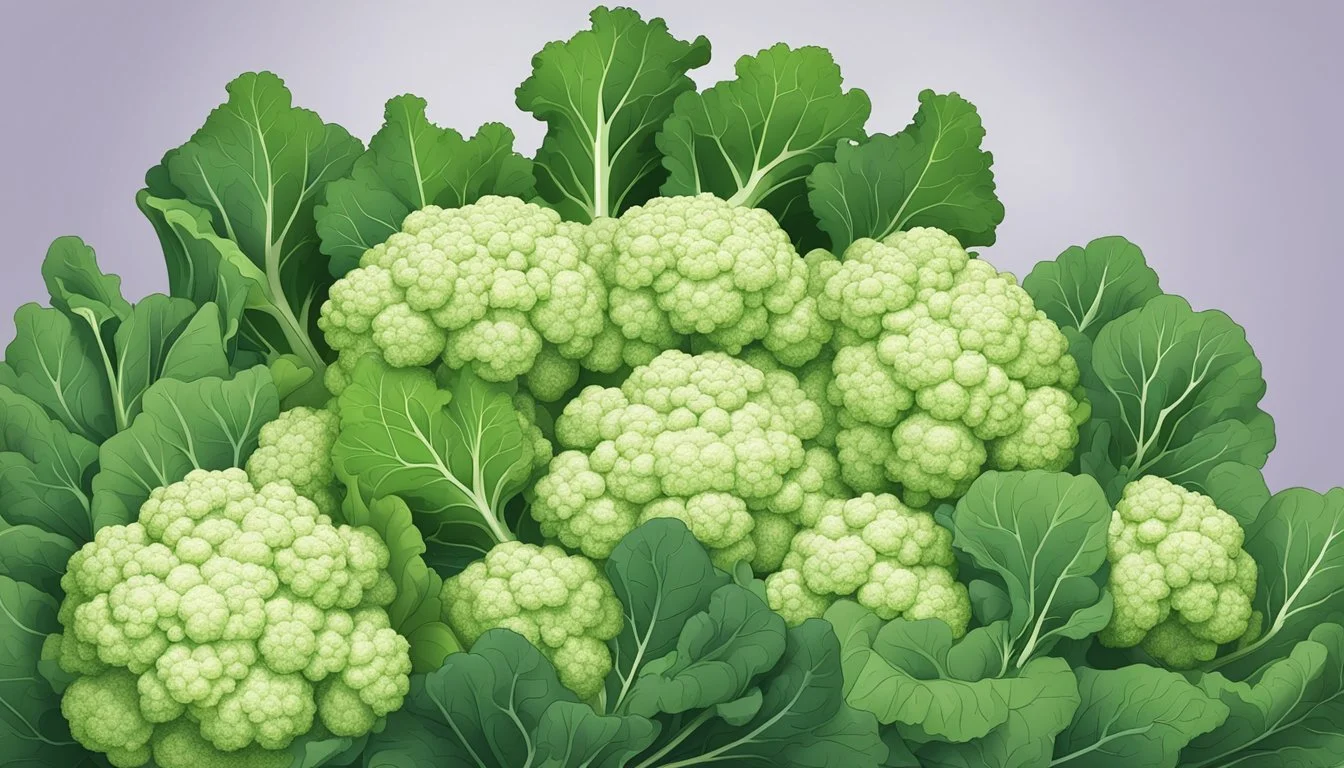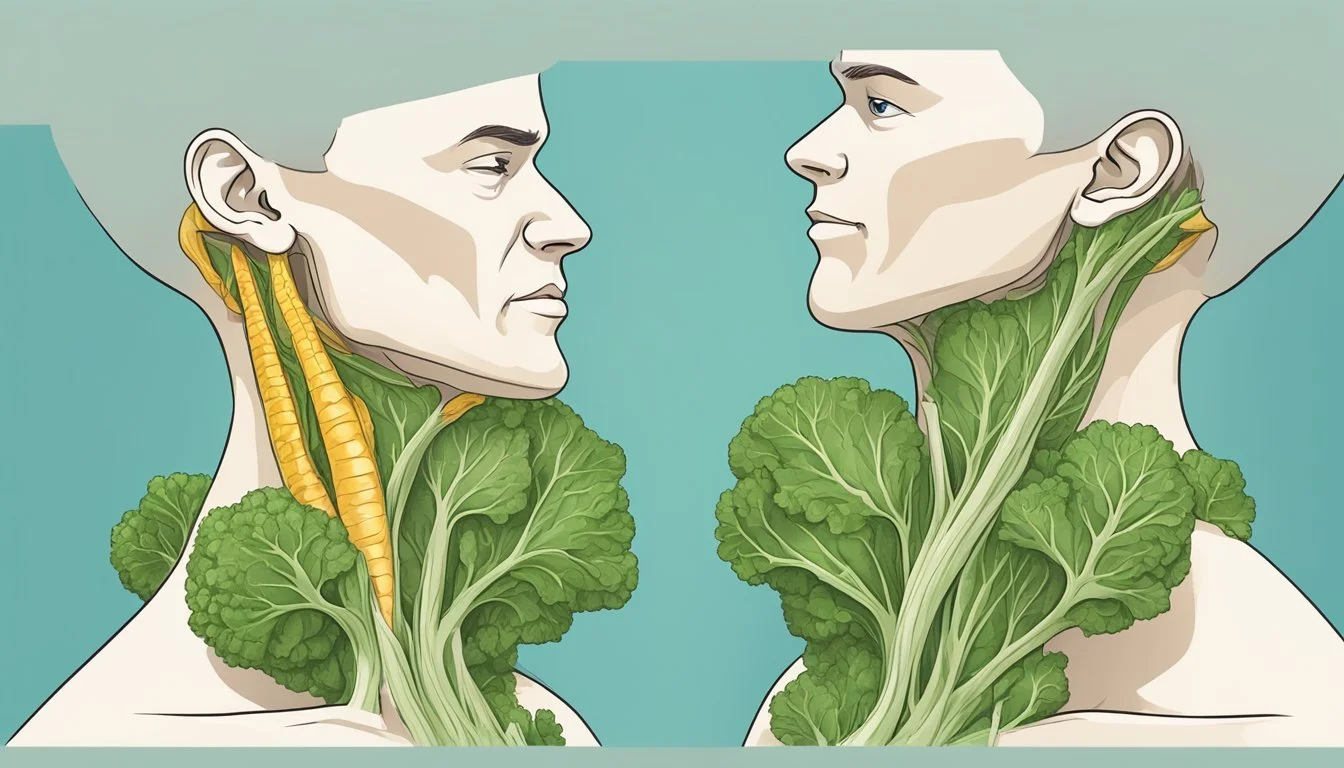Are Goitrogens in Cruciferous Vegetables a Threat to Thyroid Health?
Understanding the Impact
The thyroid gland is a critical organ that regulates metabolism, energy generation, and hormonal balance. It requires essential nutrients, including iodine, for the production of thyroid hormones, which are pivotal in these bodily functions. Certain substances known as goitrogens can interfere with this process. These compounds are found naturally in a variety of foods, most notably cruciferous vegetables like broccoli, kale, (What wine goes well with kale?) and cabbage.
Goitrogens have the capacity to disrupt thyroid function by impeding the gland's uptake of iodine, which is integral to the synthesis of thyroid hormones. While these compounds are present in everyday foods, they generally do not pose a threat to individuals with a healthy thyroid. However, in situations of excessive consumption or preexisting thyroid conditions, the impact of goitrogens on thyroid health becomes a point of consideration.
Cruciferous vegetables are often highlighted for their nutritional benefits, loaded with fiber, vitamins, and antioxidants, yet their relationship with thyroid health is complex. The presence of goitrogens in these vegetables has raised concerns over the potential for impairing thyroid function. However, studies suggest that when consumed in normal, dietary amounts, the risk to thyroid health is minimal for people with no underlying thyroid issues. The balance between the nutritious advantages and the goitrogenic activity of these foods is a nuanced aspect of dietary health, especially for those with thyroid concerns.
Understanding the Thyroid Gland and Its Functions
The thyroid gland is an essential player in regulating metabolism and overall health through the hormones it produces. Misregulation can lead to various thyroid conditions with noticeable symptoms.
Role of the Thyroid Gland in Metabolism
The thyroid gland plays a pivotal role in metabolism, the set of life-sustaining chemical reactions in the body. It produces thyroid hormones, which modulate the speed at which these reactions occur. Thyroid-Stimulating Hormone (TSH), released by the pituitary gland, regulates the production of thyroid hormones.
Increased thyroid activity (hyperthyroidism) speeds up metabolism, potentially leading to weight loss and irregular heartbeat.
Decreased thyroid activity (hypothyroidism) slows down metabolism, which can cause weight gain, fatigue, and cold intolerance.
Thyroid Hormones and Thyroid Function
Thyroid hormones, mainly thyroxine (T4) and triiodothyronine (T3), govern the body's metabolic rate.
Thyroxine (T4): This is the primary hormone produced by the thyroid gland, although it exists in a relatively inactive form.
Triiodothyronine (T3): It is the active form and is converted from T4 in various tissues in the body.
These hormones are crucial for proper growth, development, and energy production.
Common Thyroid Conditions and Symptoms
Thyroid dysfunction can manifest in various conditions, each with its own set of symptoms:
Hypothyroidism: characterized by symptoms such as fatigue, weight gain, and depression, occurs when the thyroid gland doesn't produce enough hormones.
Hyperthyroidism: presents with symptoms like weight loss, anxiety, and palpitations, arises when the thyroid gland is overactive.
Thyroid conditions are often diagnosed through blood tests measuring levels of TSH, T4, and T3.
Cruciferous Vegetables and Dietary Impact
Cruciferous vegetables are a diverse group known for their health benefits, and they play a substantial role in a balanced diet. They are dense in nutrients and may influence thyroid health due to their goitrogen content.
Profile of Cruciferous Vegetables
Cruciferous vegetables include a variety of plants that are widely recognized for their distinctive leaf, flower, or root structures. This category encompasses vegetables such as kale, cabbage, cauliflower, broccoli, Brussels sprouts, and bok choy. These vegetables are a part of the Brassicaceae family and are considered staple foods in many diets around the world due to their versatility and availability.
Nutritional Value of Cruciferous Vegetables
Nutritional content of select Cruciferous Vegetables (per 100g raw):
Vegetable Calories Fiber (g) Vitamin C (mg) Vitamin K (µg) Folate (µg) Broccoli 34 2.6 89.2 101.6 63 Cauliflower 25 2 48.2 15.5 57 Brussels sprouts 43 3.8 85 177 61 Kale 49 3.6 120 389 31 Cabbage 25 2.5 36.6 76 43 Bok choy 13 1 45 45.5 66
Cruciferous vegetables are low in calories yet high in fiber, vitamins (notably vitamin C and K), minerals, and antioxidants. The fiber content aids in digestion, while vitamins C and K are essential for maintaining the immune system and bone health, respectively. They are also a significant source of folate, beneficial for cell function and tissue growth.
Health Benefits and Consumption Advice
Cruciferous vegetables offer substantial health benefits, including the potential to reduce the risk of certain cancers and support overall health due to their high antioxidant content. While these vegetables contain goitrogens, which can interfere with thyroid hormone production, the risk to thyroid health is generally low, especially for individuals with normal thyroid function.
To minimize the potential impact of goitrogens, those with thyroid issues could consider the following:
Limiting consumption: Not exceeding recommended daily amounts.
Cooking: Heat can reduce the goitrogenic activity in these vegetables, making them safer.
Balancing the diet: Ensuring a varied diet to avoid excessive intake of goitrogens.
Consuming these vegetables as part of a balanced diet is encouraged, and cooking them can further mitigate any potential risks related to thyroid function. It's important to note that the nutritional benefits often outweigh concerns about goitrogens for most people.
Goitrogens and Their Effects on Thyroid Health
In examining how compounds known as goitrogens affect thyroid health, it is crucial to understand their nature, their potential impact on thyroid function, and the role they play in iodine absorption.
What Are Goitrogens?
Goitrogens are naturally occurring substances present in certain foods, including cruciferous vegetables, which can influence thyroid function. These compounds include goitrin, thiocyanates, and flavonoids. While they play a role in plant metabolism and defense, in humans, goitrogens can potentially interfere with the thyroid gland’s ability to produce hormones.
Impact of Goitrogens on Thyroid Function
Goitrogens can exert their effect by inhibiting the thyroid’s use of iodine, a key mineral in the production of thyroid hormones, thyroxine (T4) and triiodothyronine (T3). Excessive consumption of goitrogenic foods can lead to an enlargement of the thyroid, known as a goiter, particularly in individuals with iodine deficiency. Nevertheless, when these foods are consumed in typical dietary amounts, they generally do not present a significant risk to thyroid health for individuals with sufficient iodine intake.
Examining the Link Between Goitrogens and Iodine Absorption
Absorption of iodine into the thyroid gland may be hindered by goitrogens, as they can block the process that incorporates iodine into thyroid hormones. This can be particularly problematic in areas where the diet is low in iodine, potentially leading to conditions like hypothyroidism. However, it is important to note that for the majority of people with adequate iodine levels, the goitrogenic effects of foods are often minimal due to the body’s resilience and adaptive responses.
Factors Influencing Goitrogen Effects
Goitrogens present in cruciferous vegetables have varying impacts on thyroid health, which hinges on certain dietary and cooking habits. These factors determine the extent to which goitrogens affect the body, particularly in relation to thyroid functions.
Role of Cooking in Reducing Goitrogens
Cooking has been identified as an effective method for reducing goitrogenic compounds in cruciferous vegetables. Studies suggest that methods such as boiling, steaming, or fermenting these vegetables can substantially decrease the levels of goitrogens. For instance:
Boiling: Reduces goitrogenic compounds by as much as 30-60%.
Steaming: Can lead to a moderate reduction in goitrogens, while retaining more nutrients compared to boiling.
Fermenting: Also shown to lower goitrogen content.
Consuming these vegetables in their raw state often leaves the goitrogenic compounds intact and may potentially lead to increased risk of goiter development, particularly in the context of iodine deficiency.
Iodine Intake and Its Relation to Goitrogen Sensitivity
The interaction between dietary iodine and goitrogens is crucial in understanding thyroid health. Adequate iodine intake is essential for thyroid hormone synthesis, and a lack can exacerbate the effects of goitrogens. Important points to note include:
Those with sufficient iodine intake are less likely to experience negative effects from goitrogens.
Iodized salt is a common iodine source that can help mitigate goitrogen effects.
In areas where iodine deficiency is prevalent, even normal consumption of goitrogenic foods could pose a risk for thyroid dysfunction.
Additionally, adequate selenium intake is important for thyroid health, as it's involved in the conversion of thyroid hormones and may provide a protective effect against goitrogen sensitivity.
Clinical Research and Current Understanding
In assessing the impact of goitrogens found in cruciferous vegetables on thyroid health, clinical research plays a crucial role. This section delves into the significant findings from animal studies and human research, as well as the insights gleaned from population studies.
Evidence from Animal Studies and Human Research
Animal Studies: Research conducted on animals has provided fundamental insights into the potential impact of goitrogens on the thyroid gland. Goitrogens are compounds that can interfere with thyroid hormone production. In particular, these studies focus on the role of dietary goitrogens from cruciferous vegetables such as cabbage, broccoli, and kale. Animal models have shown that excessive intake of these vegetables can induce hypothyroidism and goiter formation, especially when dietary iodine is insufficient.
Human Research: Studies involving human subjects are more varied. Some research indicates that in individuals with pre-existing iodine deficiency, consumption of goitrogens may exacerbate thyroid dysfunction. In contrast, euthyroid individuals—those with normal thyroid function—may not experience significant effects from typical dietary intakes. In a specific study of euthyroid volunteers, the consumption of kale juice was reported to reduce thyroid radioiodine uptake minimally, suggesting a potential—but limited—effect on thyroid health.
Analyzing Population Studies on Goitrogen Consumption
United States: The general population in the United States typically receives adequate iodine through iodized salt and other dietary sources, which may counteract the effects of goitrogenic compounds. Research in the United States has not established a compelling correlation between the consumption of cruciferous vegetables and increased incidence of thyroid dysfunction among those with adequate iodine intake.
Women and Thyroid Health: Population studies specifically in women have shown mixed results. For example, research indicates that certain groups of women, such as those from regions with low iodine intake, might be more susceptible to the effects of goitrogens on thyroid health.
Types of Cancer: When it comes to types of cancer, some population studies have analyzed the potential protective effects of cruciferous vegetables against thyroid cancer due to their phytochemical composition. However, the evidence is inconclusive, with some research suggesting a slightly elevated risk of thyroid cancer with high consumption of goitrogens among women in certain populations, though the causality remains unclear.
In summary, the current understanding of the impact of goitrogens from cruciferous vegetables on thyroid health is nuanced, and heavily influenced by factors such as iodine intake and individual thyroid function.
Dietary Recommendations and Lifestyle Choices
Making informed choices about diet and lifestyle can optimize thyroid health, particularly when managing the intake of cruciferous vegetables and ensuring adequate levels of essential nutrients.
Balancing Cruciferous Vegetable Intake
One should not eliminate cruciferous vegetables from their diet as they are rich in nutrients beneficial for overall health. However, cooking these vegetables can reduce their goitrogenic activity, making them more suitable for individuals with thyroid conditions. A balanced approach involves moderation and variety, ensuring these nutrient-packed vegetables can be enjoyed without overconsumption.
Supplemental Interventions and Thyroid Medications
When dietary intake is insufficient, supplements can help maintain proper thyroid function. Iodine and selenium are crucial for thyroid health; iodine is found abundantly in seaweed, while Brazil nuts are a rich source of selenium. It's essential to synchronize supplementation with any thyroid medication and to be aware of interactions, such as the one between calcium supplements and thyroid hormone absorption. They should be taken several hours apart.
Whole Diet Approach for Thyroid Wellness
A comprehensive diet rich in a variety of nutrients supports thyroid health. Alongside moderate consumption of cruciferous vegetables, one should include sources of iodine like fish and dairy, and selenium-rich foods. Lifestyle choices play a significant role, including regular physical activity and stress management techniques, in supporting thyroid function and overall well-being.



